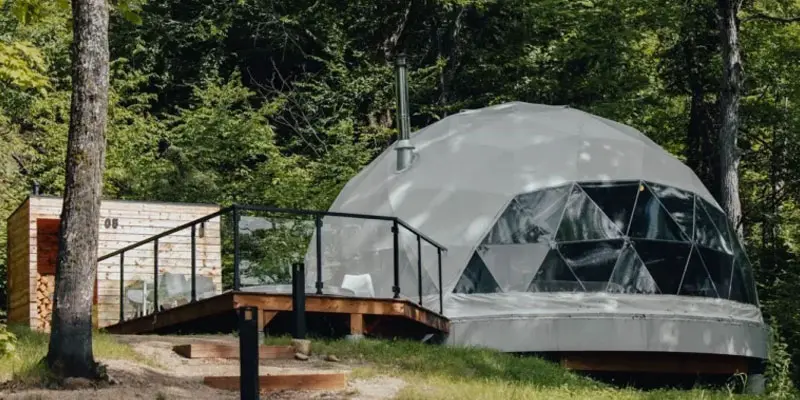
Swiss Tents vs Dome Tents: Which One Is Right for Your Needs?
Camping is more popular than ever. People love getting outdoors and exploring nature. But choosing the right tent is key. It's all about comfort, safety, and how you plan to camp. Two main options stand out: Swiss tents and dome tents. Both have unique features that suit different types of campers. Let's compare them to find out which is best for you.
Understanding Swiss Tents
What Are Swiss Tents?
Swiss tents have a long history. They date back to the Alps, used by soldiers and adventurers. They feature a boxy, traditional shape with high peaks and straight sides. Usually made from sturdy canvas or cotton, these tents are built to last. They come in different sizes — from small family setups to large, luxury camping lodges.
Advantages of Swiss Tents
- Durability and Weather Resistance: Crafted from thick canvas, Swiss tents shrug off rain and wind well. They're great for harsh environments.
- Breathability and Natural Insulation: Canvas materials breathe better than synthetic fabrics, helping keep condensation down and inside fresh.
- Aesthetic Appeal and Charm: Many campers love their classic look, which feels cozy and inviting.
- Ideal for Permanent Camps: Swiss tents shine in long-term setups, like glamping sites or backcountry bases.
Disadvantages of Swiss Tents
- Heavy and Bulky: They can be quite heavy, making transportation tricky. Not the best for backpacking.
- Longer to Set Up: Erecting a Swiss tent takes more time — usually with multiple people helping.
- Costly Investment: High-quality Swiss tents can be expensive, but they often last decades with proper care.
Exploring Dome Tents
What Are Dome Tents?
Dome tents are characterized by their rounded shape. They have flexible poles crossing each other, forming a sturdy, arch-like structure. This makes them lighter and easier to carry. Popular among hikers, backpackers, and casual campers, dome tents are versatile and available in many sizes, from compact models to larger family options.
Advantages of Dome Tents
- Lightweight and Portable: Perfect for outdoor adventures where weight matters.
- Quick and Easy to Set Up: Usually, a few stakes and some poles are enough to pitch a dome tent fast.
- Solid Stability: Their shape helps resist wind and rain. They stay firm even during storms.
- Affordable Options: Dome tents are available at many price points, fitting various budgets.
Disadvantages of Dome Tents
- Breathability Varies: Cheaper models may let in moisture or lack ventilation features.
- Less Durable in Rough Conditions: Low-quality dome tents might not withstand extreme weather.
- Simpler Aesthetic: They often look plain compared to traditional Swiss tents, more functional than fancy.
Key Factors to Consider When Choosing Between Swiss and Dome Tents
Purpose of Use
Ask yourself how you'll use the tent most. Will it be for luxury camping or quick getaways? If you want a cozy spot for family vacations, a Swiss tent could be perfect. For backpacking trips, a lightweight dome might be better. Think about how often you camp and what style fits your trips best.
Climate and Weather
Weather shapes the best tent choice. Swiss tents excel in cold, rainy, or windy areas. They offer great protection and insulation. Dome tents work well in mild to moderate weather, making them versatile for different seasons.
Portability and Setup
Are you traveling light? For hiking or backpacking, a lightweight dome tent rules. If you're setting up at a designated campsite for a week, Swiss tents may be more suitable. Setup time varies from minutes for dome tents to hours for Swiss tents.
Budget and Cost
Price matters. Swiss tents tend to cost more upfront but last longer. Dome tents are generally cheaper and suitable for short-term use. Consider what investment makes sense based on how often you camp.
Aesthetic and Comfort Needs
Want a cozy, charming space? Swiss tents' traditional look appeals to many. For a sleek, modern vibe, dome tents fit the bill. Think about interior features, like ventilation and space, that make your experience more comfortable.
Real-World Insights and Examples
A luxury glamping site in the Swiss Alps uses large Swiss tents to create a one-of-a-kind experience. The thick canvas and classic look invite guests to relax in style. Meanwhile, outdoor guides rely on sturdy dome tents for quick setup during trekking trips. Industry experts agree that each tent has its niche: Swiss tents for comfort and durability, dome tents for portability and ease.
Actionable Tips for Picking the Best Tent
- Assess your camping environment. Will you face tough weather or mild days?
- Prioritize your needs. Is convenience, durability, or style most important?
- Think long-term. Will you camp often or just once?
- Test before buying. Check setup and ventilation features in person.
Conclusion
Switzerland tents and dome tents each offer benefits suited to different campers. If you're after durability, traditional charm, and a permanent setup, Swiss tents are a great choice. For those who value light weight, quick setup, and versatility, dome tents fit the bill. The key is to match your camping style, environment, and personal preferences. Remember, investing in a quality tent designed for your needs creates a better outdoor experience. Pick wisely, and your next trip will be one to remember.













